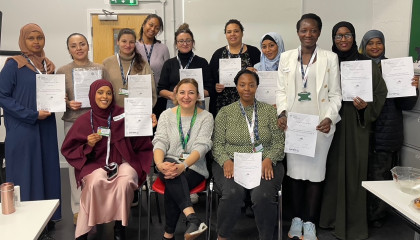You are here: News One in ten nursery workers paid below the minimum wage
New analysis by the Family and Childcare Trust finds that 20,000 nursery workers (2) are being paid below the minimum wage.
Despite flouting the law, these nurseries are receiving millions of pounds of government funding every year through free childcare offers and subsidies that help parents meet their childcare bills. These poverty wages will leave nursery workers – many of who are parents themselves – struggling to make ends meet each week.
The Government is rightfully investing in childcare because of the important role it plays in tackling inequalities: it helps parents work and high quality childcare helps to narrow the gap between disadvantaged children and their peers. But this funding will only achieve its potential if it pays for high quality childcare with valued staff.
Today, staff over the age of 25 are entitled to a minimum wage of £7.20 per hour – adding up to about £13,000 a year – but the Department for Education’s own data (3) shows that 10 per cent of nursery workers are not receiving even this much. Increases to the minimum wage are the lynchpin of the Government’s strategy to tackle poverty – but this could be left in tatters without a crackdown on employers not meeting this minimum standard.
Twenty-two childcare providers have recently been subject to enforcement action from HMRC for non-payment of the minimum wage. (4) These recently released figures suggest that this is just the tip of the iceberg.
Ellen Broome, Deputy Chief Executive of the Family and Childcare Trust, said:
“Nursery workers care for and educate the next generation – this important role deserves decent pay. But instead they are being exploited and paid illegal poverty wages.
“This cannot be right. Central and local government must act immediately to make sure that every childcare worker is paid a decent wage and that tax payers’ money does not go to employers who break the law.
"High quality childcare does not come on the cheap. Paying staff at least the minimum wage will help make sure children get the high quality care that sets them up for school and improves their long term outcomes.”
-ENDS-
Contact: Mark Bou Mansour, telephone 020 7940 7535 or 07538 334 772, email: mark@familyandchildcaretrust.org
Notes to editor:
- Average pay in these private, voluntary and independent nurseries for someone who is not in a management role is about £8 per hour, or just over £13,000 a year for full time work (Childcare and early years providers survey 2016). 98 per cent of the workforce is female (Provision and Use of Pre-School Childcare in BritainUCL/Institute of Education).
- Nursery workers includes staff in private, voluntary and independent nurseries, but not maintained nurseries or schools.
- Childcare and early years providers survey: 2016, Department for Education.
- ‘Record number of employers named and shamed for underpaying’, BIS press release, 15 February 2017.
- Figures were calculated by multiplying the number of staff working in group based settings (p55 of the DfE’s Provider Survey) by the percentage of staff aged over 25 in the childcare workforce (figures calculated by the Institute of Education at UCL), and multiplying this figure by the percentage of staff aged over 25 being underpaid (p69 of the Provider Survey).
- Minimum wage rates for different age groups are:
|
|
Up to 31 March 2017 |
After 1 April 2017 |
|
Over 25s |
£7.20 |
£7.50 |
|
21 to 24s |
£6.95 |
£7.05 |
|
18 to 20s |
£5.55 |
£5.60 |
|
Under 18s |
£4.00 |
£4.05 |
|
Apprentices |
£3.40 |
£3.50 |
Further information on minimum wage entitlements: HMRC
About the Family and Childcare Trust
The Family and Childcare Trust aims to make the UK a better place for families. We are a leading national family charity in the field of policy, research and advocacy on childcare and family issues, with over 40 years’ experience. Our on-the-ground work with parents and providers informs our research and campaigns. We focus on the early years and childcare because they are crucial to boosting children’s outcomes throughout life and supporting parents to work.
Latest news
Meet Sarah - Best Newcomer!
19 May 2025
'It takes a village'
20 May 2025
How Parent Champions Islington reached families across the community





